Rags2Riches weaves a powerful commitment to achieving circular fashion
Discarded-fabric-turned-masterpieces made possible
By Mat Richter
In the race for trends, fast fashion — the overproduction and overconsumption of clothes — sprints and thrives at the expense of sustainability.
A 2021 report from the World Economic Forum states that fast fashion contributes around 10 percent of global warming emissions, the main driver of climate change.
Without reform, the UN Environment Programme warns that the industry could consume a quarter of the world's carbon budget by 2050.
These alarming figures pose a global issue, but businesses and consumers can help by repurposing discarded items and only buying what's needed.
Take inspiration from Rags2Riches (R2R), a sustainable fashion design house that transforms deadstock fabric into artisanal handwoven bags, clothes, and accessories, proving that fashion can still be environmentally responsible.

Sustainable artisanal story
For 16 years, R2R has aimed to alleviate poverty among Filipino artisans by partnering with them and creatively repurposing discarded fabric into stylish items.
“Actual human beings make the R2R pieces. They are artisans who are weaving their own stories and transforming their own lives for the better. And we are so here for it. As in, we started because of them,” its website reads.


The fashion design house walks the talk, having partnered with seven indigenous communities and provided livelihoods to 78 urban artisans in 2023 alone.
This dedication is reflected in the company's sustainable collections, which often showcase handcrafted indigenous textiles or carved wood, including the Balai Kamay, Mangyan Ramit, Binakol, and T'nalak.
Among its bestsellers are Buslo Micro Checkerboard, Bento Beige 1.0, and other elegant bags in brown and black, each echoing an artisanal story.
Circular fashion in action
R2R does its best to come close to "perfect" sustainability, upcycling tons of pre-production deadstock fabric while actively sourcing eco-friendly materials throughout the supply chain.
In 2023, the eco-ethical fashion company upcycled 12,350 kilograms of textile waste, or those that were factory rejects and overstocked over the years.

"We began partnering with local designers to create high fashion pieces from the women’s weaves. The women no longer had to sell rags in the street. Fashion is not just about style. It has to be about substance and sustainability," said R2R President and Co-Founder Reese Fernandez-Ruiz.
In essence, R2R's commitment to circular fashion not only mitigates textile waste but also champions social empowerment, weaving a story of sustainability that leaves no woman behind.
The fashion house serves not only as a stylistic statement, but also as a catalyst for substantive change, with every sustainable purchase helping Filipina artisans and, ultimately, the planet — our only abode.